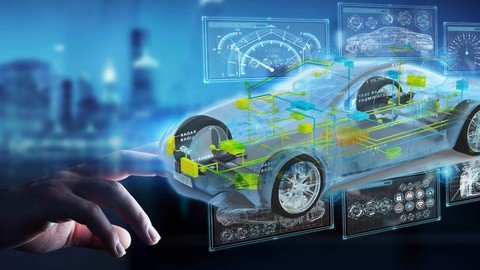
Published 1/2024
MP4 | Video: h264, 1920×1080 | Audio: AAC, 44.1 KHz
Language: English | Size: 2.66 GB | Duration: 8h 16m
Covers in depth knowledge of CanDrv, CanIF , CanTP, PDUR and COM Modules
What you’ll learn
Gain complete understanding of Communication stack in AUTOSAR
Understanding of functionality of Can Driver, Can IF modules
Understanding of functionality of CanTP, PDUR and Com Modules
Will gain thorough knowledge about COM stack and ability to apply these concepts in Autosar related projects.
Will have understanding of how these modules interact with each other and API’s involved
Requirements
Basic knowledge of AUTOSAR
Description
When I started working as a professional , I tried searching relevant contents and explanation on Com Stack but i was unable to find a structured course online, there were just huge documents and it difficult to understand for a new person, so this led me to make this course on Com Stack so that others benefit from my experience.Communication Stack facilitates vehicle network communication. Communication stack also helps in software updates and Diagnostics. Com Stack can be defined as a software stack that provides communication services to the Basic Software Modules and Application Layer/Application Software. This course is developed considering the required knowledge needed to work on Com Stack. It is a well versed and structured course keeping in mind the audience from experienced professionals to freshers.This course covers below topics and modules in Detail:1. CAN2. Can Driver3. CanIF4. CanTP5. PDUR6. COMThese topics are explained in detail, I have explained their functionality, how these module interacts with each other , function descriptions , sequence diagrams and configuration details I will be updating the course based on feedback from audience from time to time and will also add lectures on CanSM and CanNM modules.I wish all the best to you and Happy Learning !!
Overview
Section 1: Introduction
Lecture 1 Introduction
Lecture 2 COM Stack Introduction
Lecture 3 PDU Flow
Lecture 4 Frame/PDU/Signal
Section 2: CAN
Lecture 5 CAN Intro
Lecture 6 CAN Frame and Arbitration
Lecture 7 DATA Frame
Lecture 8 Transmitter & Receiver Node
Lecture 9 Broadcasting Frame
Lecture 10 Arbitration
Lecture 11 Bit Timing
Lecture 12 Bit Stuffing
Lecture 13 Errors in CAN
Lecture 14 Error Frame and Overload Frame
Lecture 15 CAN Physical Layer
Section 3: CAN Driver Module
Lecture 16 Can Driver Introduction
Lecture 17 Important Terminologies
Lecture 18 Lower Priority Inversion
Lecture 19 Outer Priority inversion
Lecture 20 Driver Services
Lecture 21 CAN Driver State Machine
Lecture 22 CAN Controller states
Lecture 23 State Transitions and Can Driver Initialisation
Lecture 24 LPDU Transmission and Reception
Lecture 25 Wakeup and Notification
Lecture 26 Reentrancy, Timestamping and Errors
Lecture 27 CAN FD Support
Lecture 28 Important CAN API’s
Lecture 29 CAN Driver Configuration Details
Section 4: CAN IF Module
Lecture 30 CAN If in Autosar Layered Architecture
Lecture 31 CAN If Introduction
Lecture 32 Common Terminologies
Lecture 33 CAN If Interaction with other BSW Modules
Lecture 34 CAN IF Application
Lecture 35 HOH
Lecture 36 HRH and HTH
Lecture 37 Physical Channel View
Lecture 38 Static & Dynamic LPDU
Lecture 39 Basic CAN and Full CAN
Lecture 40 Transmit Data
Lecture 41 Transmit Buffering
Lecture 42 Multiple CAN Driver Support
Lecture 43 Sequence Diagrams for Transmission
Lecture 44 Reception
Lecture 45 Controller Modes
Lecture 46 Sequence Diag- Start CAN Network
Lecture 47 PDU Channel Mode Control
Lecture 48 Software Filtering
Lecture 49 Data Integrity and Data Length Check
Lecture 50 Sequence Diag – Receive Indication
Lecture 51 Sequence Diag – Notification With Multiple CAN Driver
Lecture 52 LSDU Disptacher
Lecture 53 Polling Mode
Lecture 54 Partial Networking
Lecture 55 CAN FD Support
Lecture 56 Security Events
Lecture 57 Development & Runtime Errors
Lecture 58 Bus Off and Bus off Recovery
Lecture 59 CAN IF API’s
Lecture 60 Callback Notification API’s
Lecture 61 Mandatory Interfaces
Lecture 62 Configurable Interfaces
Lecture 63 Configurations
Section 5: CAN TP Module
Lecture 64 Introduction
Lecture 65 Can TP Frames
Lecture 66 Services provided to upper layer
Lecture 67 Services Provided to lower layer
Lecture 68 N-SDU Reception
Lecture 69 N-SDU Transmission
Lecture 70 Buffer Strategy
Lecture 71 Relationship between CAN NSduId and CAN LSduId
Lecture 72 Concurrent connection and N-PDU padding
Lecture 73 Development and Runtime Error
Lecture 74 API’s Details
Lecture 75 Configuration
Section 6: PDUR Module
Lecture 76 Introduction
Lecture 77 Functional Overview and Operations
Lecture 78 IPDU Handling
Lecture 79 PDU Reception
Lecture 80 Cancel Transmission and Reception
Lecture 81 State Management
Lecture 82 Routing Path Groups
Lecture 83 Error_Classification
Lecture 84 Sequence Diagrams
Lecture 85 API Details
Lecture 86 Configuration Details
Section 7: COM Module
Lecture 87 COM Module Intro
Lecture 88 Frame / PDU/ Signal
Lecture 89 Com Interaction with other BSW modules
Lecture 90 Initialization and Deinitialization of COM Module
Lecture 91 Data Flow (Transmit)
Lecture 92 Data Flow (Receive)
Lecture 93 DatatTypes and Endianness
Lecture 94 Message Reception
Lecture 95 Reception Filtering
Lecture 96 Transfer Property and Transmission Modes
Lecture 97 Minimum Delay Timer
Lecture 98 Use cases
Lecture 99 Signal Invalidation
Lecture 100 Handling of IPDU Groups
Lecture 101 Starting and Stopping of IPDU Groups
Lecture 102 Signal Indication
Lecture 103 Reception Deadline Monitoring
Lecture 104 Transmission Deadline Monitoring
Lecture 105 Signal Groups – Complex Data Types
Lecture 106 Array Based Access to Signal group
Lecture 107 Large Data Types
Lecture 108 Dynamic Length Signals
Lecture 109 Interface between AUTOSAR COM Module and the PDU Router
Lecture 110 Update-Bits
Lecture 111 Signal Gateway
Lecture 112 Error Classifications
Lecture 113 Function Definitions
Lecture 114 CallBack Functions and Scheduled Functions
Lecture 115 Interfaces
Lecture 116 ComGeneralConfig
Lecture 117 Configuration
Lecture 118 Thank You !!
To Learn in detail about COM stack of Autosar
Password/解压密码www.tbtos.com
转载请注明:0daytown » Autosar Com Stack